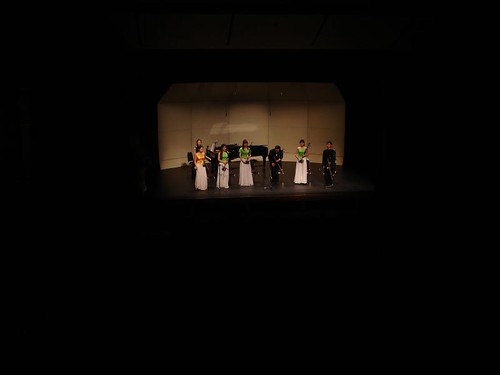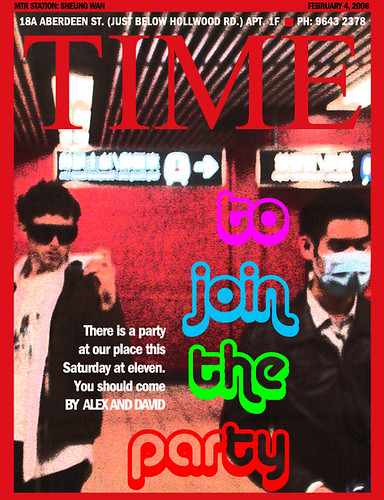I wander for hours through the usual labrynth of stalls and narrow, neon streets of Tsim Sha Tsui, the smell of cooking meats and sewage and familiar perfume blending with the hum of Cantonese callers and cheap stereos blasting a timeless global symphony around me. I buy a collection of old postcards of Chinese emperors. I didn't want to, but the woman selling them kept lowering the price. I buy a China doll dress, for a costume party. Again, I wasn't sold on it, but I heard myself say okay and took off down the street rapidly as if to prevent myself from buying anything else, like a group of pastries, or some cool new shoes. (The pastries are just okay, the shoes I left behind.)

Chungking Mansions is a serious warren of Indian and Pakistani shops, a tall, dense street mall out of Blade Runner or Bombay, crowded by men pushing suits, food, at each other, stuff they won't mention by name. The elevator banks have closed circuit monitors next to them to show the many people waiting--people in pagdis and leather looking, knowingly, as if they could have come from almost any dark alley in Southeast Asia--what's going on inside the elevators. This is a deterrent to would-be theives or worse, it's a safety blanket, but it's also, inadvertantly, pretty unsettling to think that we need the video cameras to begin with.
This place started attracting enterprising Indian fathers in 1981 according to my eager waiter at Punjab Food. It definitely caught on. Every emigrant seems to have a second family here. At the next small table a Chinese woman in a suit explains to the owner, in an English that sounded like another language, why he should bring his family over from Punjab soon, and how much it would cost him. I can't make everything out, and I'm not sure the owner can either, but it sounds like she is either deceiving him or is in with some corrupt officials. Brigitte Lin comes to mind--she played the mysterious, ruthless underground doyenne who uses some Indian cartel to traffic drugs in Wong Kar-Wai's Chungking Express. The mansions, the dark corners of Kowloon, play a memorable role in the first act of that movie. I started watching the taut opening scene, tracking Maggie as she pushes through the halls in her trenchcoat and sunglasses, a month ago when I first went there. A Pakistani man wanted to sell it to me, and put it on his TV for me, but it was dubbed over in Italian.

Going to go to another good Indian place I heard about; you have to take the elevators to get there. I could use a new suit, so perhaps I'll let myself be pressured into buying one next time I go. When I walk through now I either wear my big black sunglasses (ala Brigitte) and move a bit haphazardly, in the vague hopes I'll convince the flier-pushers and restaurant hawkers that I'm blind (though I probably won't stop them from putting things in my hands), or recite poems quietly into my cell phone, as if I'm having a conversation and can't be bothered. I am though, having a conversation. I wonder what would happen if I just walked through toting a gun.
Earlier in the day, thinking about a video that Tom Odell and I never finished, barely made, about Winthrop House, and the tape that may have gotten away, I wander onto the Star Ferry because I know it will take me somewhere. I watch it roll in past the fake island of debris and cranes, past the junks, in front of the bright, faded skyline. The fresh winter pollution, wafting over the mountains from China, meets me briskly on the harbor, sitting on the weathered benches of the boat. The wind swims around my body and I feel a rare chil, the hairs on my legs stand up not as a reflex but as if knowing something new's coming.
We want estrangement from the familiar, but we don't want it to be too hard either. It can be had anywhere, even in your home city, and while that's the hardest, there's always an easy escape back to what we know. Hong Kong is a deceptively familiar place, global and yet so far away from the familiar, that I find myself falling into moments of great distance; I feel estranged from even the very familiar things here because they are conditioned by a long foreign history (of colonialism, of hybridity, of globalization) and a great unknown. But how to be comfortable in the unfamiliar and relish it too, how to find the familiar in the unfamiliar--not the other way around--that's the greatest trick now.








